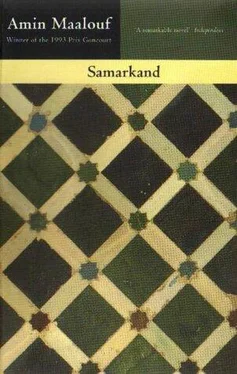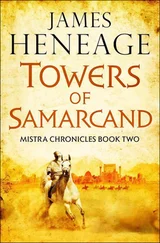‘I hope that my friend Henri is keeping well. I heard that his return from exile was a real triumph. With all those Parisians lining the streets and shouting his name, he must have felt great happiness! I read the account in l’Intransigeant . He sends it to me regularly although it reaches me late. Reading it brings back to my ears the sounds of Paris.’
Jamaladin spoke laboured but correct French. Sometimes I prompted the word he seemed to be looking for. When I was right, he thanked me and if not, he continued to rack his brains, contorting his lips and chin slightly. He carried on:
‘I lived in Paris in a room which was dark but which opened up on to a vast world. It was a hundred times smaller than this house but I was less cramped there. I was thousands of kilometres from my people but I worked for their advancement more efficiently than I can do here or in Persia. My voice was heard from Algiers to Kabul. Today only those who honour me with their visits can hear me. Of course they are always welcome, particularly if they come from Paris.’
‘I do not actually live in Paris. My mother is French and my name sounds French, but I am an American. I live in Maryland.’
This seemed to amuse him.
‘When I was expelled from India in 1882 I stopped off in the United States. Can you imagine that I even envisaged asking for American citizenship. You are smiling! Many of my fellow Muslims would be scandalised. The Sayyid Jamaladin, apostle of the Islamic renaissance, descendant of the Prophet, taking the citizenship of a Christian country? However, I was not ashamed of it and moreover I have told this story to my friend Wilfrid Blunt and authorized him to quote it in his memoirs. My justification is quite simple: there is no single corner of the whole of the Muslim world where I can live free from tyranny. In Persia I tried to take refuge in a sanctuary which traditionally benefits from full immunity, but the monarch’s soldiers came in and dragged me away from the hundreds of visitors who were listening to me, and with one unfortunate exception, almost no one moved or dared to protest. There is no religious site, university or shed where one can be protected from the reign of the arbitrary!‘
He feverishly stroked a painted wooden globe which rested on a low table before adding:
‘It is worse in Turkey. Am I not an official guest of Abdul-Hamid, the Sultan and Caliph? Did he not send me letter after letter, reproaching me, as the Shah did, for spending my life amongst infidels? I should have just replied: if you had not transformed our beautiful countries into prisons, we would have no need to find refuge with the Europeans! But I weakened and let myself be tricked. I came to Constantinople and you can see the result. In spite of the rules of hospitality, that half-mad man holds me prisoner. Lately I sent a message to him, saying “If I am your guest, give me permission to depart! If I am your prisoner, put shackles on my feet and throw me into a dungeon!” However, he did not deign to respond. If I had the citizenship of the United States, France or Austria-Hungary, never-mind that of Russia or England, my consul would have marched straight into the grand vizir’s office without knocking and he would have obtained my freedom within a half-hour. I tell you, we, the Muslims of this century, are orphans.’
He was breathless but made an effort to add:
‘You may write up everything that I have just said except that I called Sultan Abdul-Hamid half-mad. I do not wish to lose every last chance of flying out of this cage one day. Besides, it would be a lie since that man is almost completely mad, a dangerous criminal, pathologically suspicious and completely under the sway of his Aleppine astronomer.’
‘Have no fear, I shall write nothing of all this.’
I took advantage of his request to clear up a misunderstanding.
‘I must tell you that I am not a journalist. Monsieur Rochefort, who is my grandfather’s cousin, recommended that I come and see you, but the aim of my visit is not to write an article about Persia nor about yourself.’
I revealed to him my interest in the Khayyam manuscript and my intense desire to be able to leaf through it one day and to study its contents closely. He listened to me with unflagging attention and evident joy.
‘I am obliged to you for snatching me away from my woes for some moments. The subject that you mention has always gripped me. Have you read in Monsieur Nicholas’ introduction to the Rubaiyaat , the story of the three friends, Nizam al-Mulk, Hassan Sabbah and Omar Khayyam? They were radically different men, each of whom represented an eternal aspect of the Persian soul. Sometimes I have the impression that I am all three of them at the same time. Like Nizam al-Mulk I dream of establishing a great Muslim state, even if it were led by an unbearable Turkish sultan. Like Hassan Sabbah, I sow subversion over all the lands of Islam, I have disciples who would follow me to the death …’
He broke off, worried, then pulled himself together, smiled and carried on:
‘Like Khayyam, I am on the look-out for the rare joys of the present moment and I compose verses about wine, the cupbearer, the tavern and the beloved; like him, I mistrust false zealots. When, in certain quatrains, Omar speaks about himself, I sometimes believe that he is depicting me: “On our gaudy Earth there walks a man, neither rich nor poor, neither believer nor infidel, he courts no truth, venerates no law … On our gaudy Earth, who is this brave and sad man?”’
Having said that, he relit his cigar and became pensive. A small piece of glowing ash landed on his beard. He brushed if off with a practised gesture, and started speaking again:
‘Since my childhood I have had an immense admiration for Khayyam the poet, but above all the philosopher, the free-thinker. I am amazed that it took him so long to conquer Europe and America. You can imagine how happy I was to have in my possession the original book of the Rubaiyaat written in Khayyam’s own hand.’
‘When did you have it?’
‘It was offered to me fourteen years ago in India by a young Persian who had made the trip with the sole aim of meeting me. He introduced himself to me with the following words: “Mirza Reza, a native of Kirman, formerly a merchant in the Teheran Bazaar. Your obedient servant.” I smiled and asked him what he meant by saying “formerly a merchant”, and that is what led him to tell me his story. He had just opened a used clothing business when one of the Shah’s sons came to buy some merchandise, shawls and furs, to the value of eleven hundred toumans — about one thousand dollars. However, when Mirza Reza presented himself the next day to the Prince’s to be paid, he was insulted, beaten and even threatened with death if he took it into his head to collect what he was owed. It was then that he decided to come and see me. I was teaching in Calcutta. “I have just understood,” he told me, “that in a country run in an arbitrary fashion one cannot earn an honest living. Was it not you who wrote that Persia needs a Constitution and a Parliament? Consider me, from this day on, your most devoted disciple. I have shut my business and left my wife in order to follow you. Order and I shall obey!”’
In mentioning this man Jamaladin seemed to be suffering.
‘I was moved but embarrassed. I am a roving philosopher, I have neither house nor homeland and have avoided marrying in order that I would have no one in my charge. I did not want this man to follow me as if I were the Messiah or the Redeemer, the Mahdi. To dissuade him I said: “Is it really worth leaving everything, your business and your family, over a wretched question of money?” His face closed up, he did not respond, but went out.’
Читать дальше












